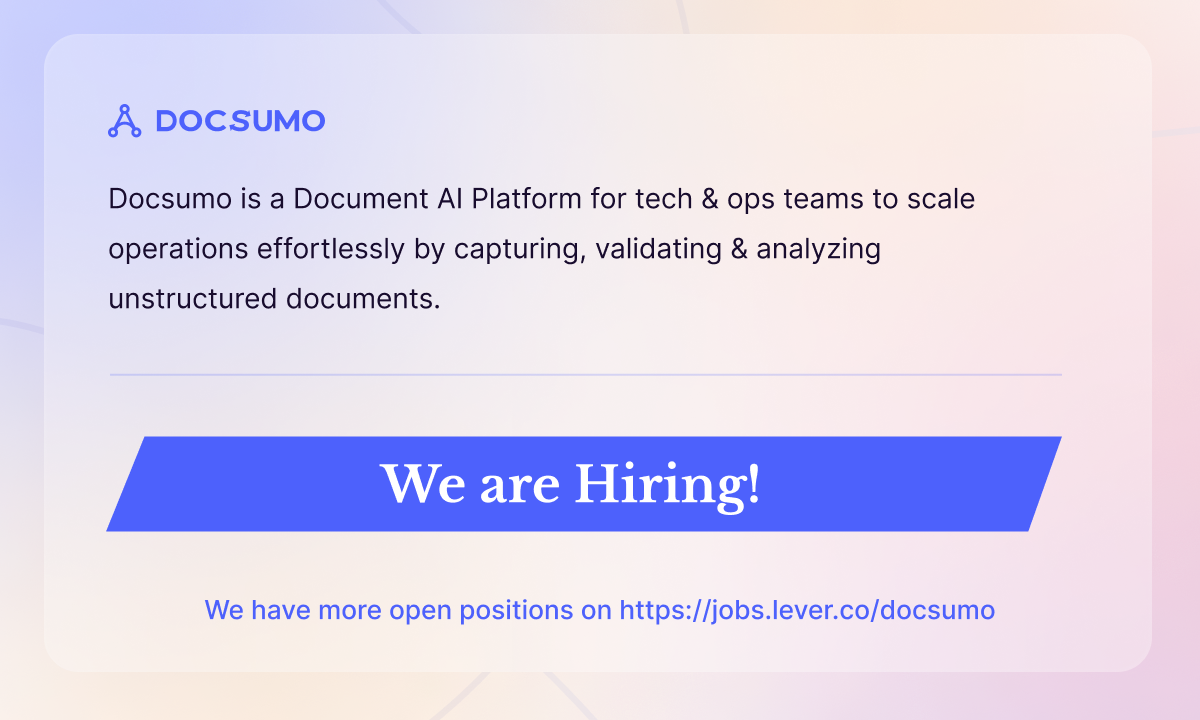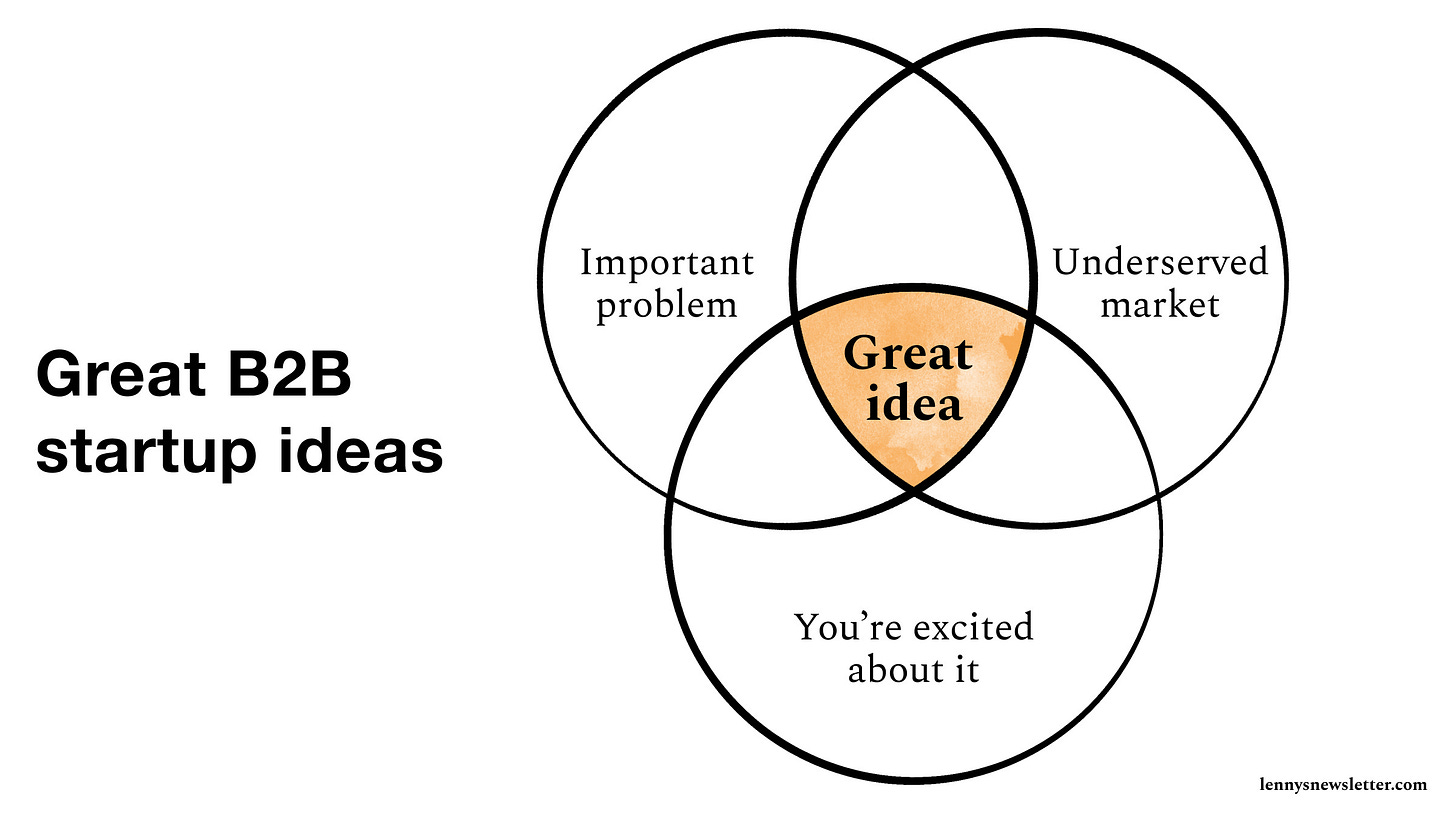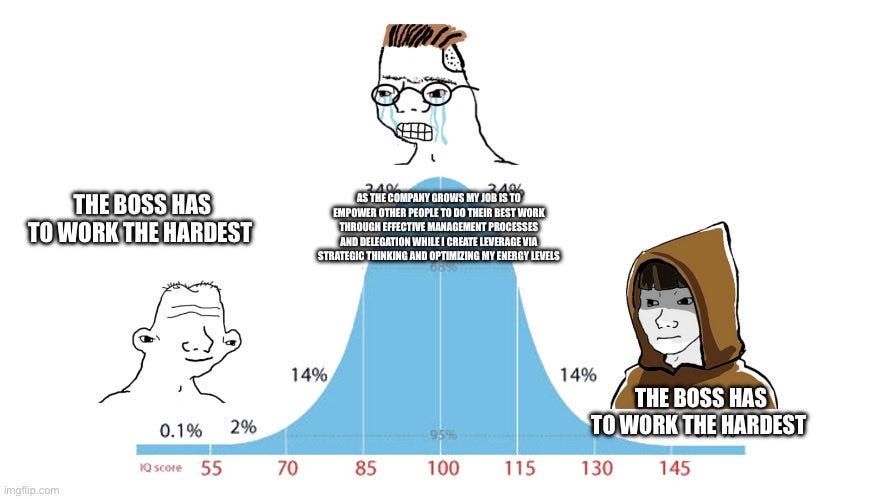Notes from a CTO #9: Giving up control and how people get startup Ideas
Thought on giving up control, B2B startup stories and some great articles on Incident postmortems and LLM as a tool.
Hey, it’s Bkrm from Docsumo.
You’re reading the Ninth Issue of Notes from a CTO, my raw canvas of thoughts and collection of interesting resources I found online. My goal here is to spread knowledge. If this is up your alley, have a read and let me know what you think!
1. Thought of the Week
This week, let's discuss only one thing that matters for your success as founder: Giving up control.
As a startup founder, there are two invaluable assets that you cherish above all else: your time and control. Time is a finite resource, and as an entrepreneur, every minute counts. However, control is often the more challenging aspect to navigate.
It's natural to desire control. I often joke about the reason I started Docsumo – it's because in my first company, HR established a policy that prevented me from wearing shorts and flip-flops to the office. I had told my colleagues that when I had my own company, I would wear them every day. And true to my word, that's exactly what I do now.
It's natural for founders to have a deep sense of attachment to their vision and their company. After all, it's your brainchild, and you've poured your heart and soul into it. You've made countless sacrifices, taken risks, and made tough decisions along the way. As a result, the idea of giving up control can seem daunting and even counterintuitive.
I still remember when Rushabh asked me to stop coding around 1.5 years into the startup. At that time, I was spending 90% of my time coding. He suggested that I step back and let someone else handle it. I was quite stubborn and felt a bit offended by his suggestion. I thought, "How could you even ask me to stop?" However, looking back, I now realize that it was one of the best pieces of advice I received.
As the company grows, your responsibilities multiply, and the demands on your time increase exponentially. Trying to oversee every minute detail and micromanaging every aspect of the business can lead to burnout and a bottleneck in decision-making processes.
To truly thrive as a co-founder, you must learn to let go. This doesn't mean abandoning your responsibilities or relinquishing your authority entirely. It means trusting in the abilities of your team and empowering them to take ownership of their roles. Delegating tasks, assigning responsibilities, and providing guidance rather than micromanaging are key steps in this process.
Here's how I approach working with each leader I hire:
Presenting Problems, Not Solutions: I can’t keep my mouth shut, I am slowly learning to let silence speak. Sometimes, it's about laying out the problem and observing the solutions the team comes up with. If they propose something better or parallel to my initial idea, it boosts my confidence. If not, I guide them with questions to steer them towards my thinking or to encourage better solutions.
Delegating with Precision: The individuals we have brought on board are undoubtedly intelligent. Often, the only missing piece is a clear explanation of the vision and task. Resolving this will solve 50% of your problem. Encouraging them to jot down plans in sprints and tasks, or having them explain these back, is all that's needed.
Embracing Mistakes: Whether it's selecting new tools or brainstorming solutions for new features, I allow the team to come up with ideas. Even if an idea is incorrect and I can spot it from a distance, I dont step in to refine it. I just guide them and let them deliberate, I grant them the time to reach a final concept. Yes, it may take more time, and I could have saved 3-4 hours or days by intervening, but growth wouldn't have been nurtured.
Regular Stand-Up Meetings: Granting control doesn't equate to abandoning matters overnight. I've participated in daily stand-up meetings with my team for four years, never missing a single one. Whether it's to gain confidence or simply the desire to stay informed, this habit has evolved. It nurtures confidence over time and helps redirect the team early on when necessary.
Valuing Feedback: After every successful interview, I consistently ask for feedback; I genuinely value input from everyone. While there are instances when I receive feedback that I might not initially appreciate, I refrain from dismissing it as incorrect. Instead, I take a moment to reflect on it calmly, considering what I can extract from it to enhance and improve it.
By giving control, you create space for innovation, collaboration, and the cultivation of diverse perspectives. Your team members bring unique skills, experiences, and insights to the table. Embrace their expertise and allow them to contribute fully to the growth of your startup.
Furthermore, giving up control doesn't equate to losing influence or diluting your vision. It means fostering a culture of trust, transparency, and open communication. Clearly communicate the company's goals, values, and strategic direction to ensure everyone is aligned. Encourage your team members to share their ideas, challenge the status quo, and contribute to shaping the company's future.
At the end of the day, you hire a team to decrease your tension, not increase it. What is the use of a team that increases your tension?
2. Podcasts/Essays
Here is a long article I recommend to anyone interested in startups.
How the most successful B2B startups came up with their original idea | 35 mins read
I often wonder how some people came up with the idea for their startup. This article breaks it down very nicely, providing detailed stories. While it's true that you cant replicate the same process, stories are always good to hear, and see what you can learn from them.
One important point they highlight is being genuinely excited about it. This is very critical. When things are not going as you planned, can you wake up and have the same level of excitement as when you started? If you did it solely for money or if you haven't built a company that people love being a part of, this can be very challenging. When things are going well, everyone is good and happy. However, when things are not going according to plan (and this will happen every other day), the excitement of waking up and getting things done is what will keep you moving forward.
3. Interesting links
Repos:
Noti: Never sit and wait for some long-running process to finish. Noti can alert you when it's done. You can receive messages on your computer or phone.
Quivr: I write a lot of notes, but organizing and retrieving them when I need them can be a challenge. Quivr is an interesting project designed to easily store and retrieve unstructured information using the latest LLM models.
OpenAI Pugin: I was wondering how all of these plugins were made. I will try something over the weekend, have a few interesting ideas.
rsync-time-backup: You don't need backup until you need it.
For more follow me on Github: bkrmdahal
Articles:
Unleashing The Power Of Unstructured Data: The Rise Of Large AI Models: My first article on Forbes about the latest developments in AI models and their potential and limitations.
Reducing our error rate: Engineers sometimes get too attached to new fancy things. However, the plain old manual approach can often be the best way to get things done. There's no need for fancy tools that will cost you an arm and a leg (you know what I'm talking about, Datadog).
Respecting what comes before: The internet went wild over the Amazon video article on microarchitecture. This article talks about the thinking process in old and new architecture. And is this same thing I tried to teach all engineers at Docsumo that 90% of the time, there is a very good reason why something was done the way it was done. 10% of the time, it was just stupid by design (in my code and arch, it might be the opposite). “It is essential to acknowledge that hindsight judgments often fail to consider the unknown factors and complexities that influenced decisions made by engineers. Software engineering is a dynamic field with ever-evolving requirements, limited resources, and shifting priorities.”
Inside datadog $5 million outrage: Post-mortems of incidents are always a good read. I always put myself in their shoes and think about what I would have done. Sometimes, I am paralyzed, unable to imagine what actions I would take. This increases my respect for engineers and leaders tremendously.
Against LLM maximalism : As engineers, our job is to see all tools as tools, not sliver bullets. LLM is also a tool, not a sliver bullet. From article “Instead of throwing away everything we’ve learned about software design and asking the LLM to do the whole thing all at once, we can break up our problem into pieces, and treat the LLM as just another module in the system. When our requirements change or get extended, we don’t have to go back and change the whole thing. We can add new modules, or rearrange the ones we’re already happy with.”
4. Quotes/ Books
The more choices you give people, the more help with decision making you need to provide.
- Richard H. Thaler, Nudge: The Final Edition
For the last few months, I have taken ownership of the product and have been building a robust product team at Docsumo. One thing I have noticed is that everyone is biased about the features and things we need. Everyone has their own ideas, from the CEO and CTO to the Customer Success team, Sales team, and Engineering team. The only way we will be able to build things without letting Rushabh's and my biases take center stage in every product decision is to rely on data and make product decisions more systematic. We are in the process of constructing a robust analytics and user interview/customer feedback framework that all Product Managers need to implement. As is often the case, this task is simpler said than done. Nevertheless, we are making solid progress. The idea here is to give people less choice and make them follow the process so that no matter who does it, they come to a similar conclusion with little bias.
Our Slack channels have a great collection of memes.
That’s it for this edition. I hope you find it useful.
P.S. I will attempt to have a monthly edition without any breaks. The last few months have been quite hectic, as I've been striving to reinstate the habit.
Best,
Bikram Dahal
P.S.S If you learned something new today, please share “Notes from a CTO” with your friends and spread the love. ✌🏻



